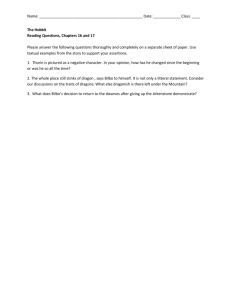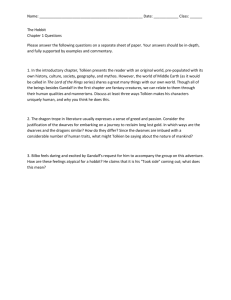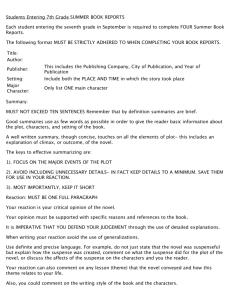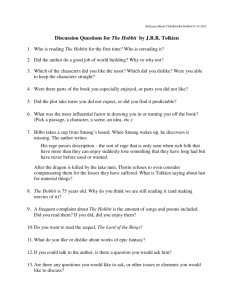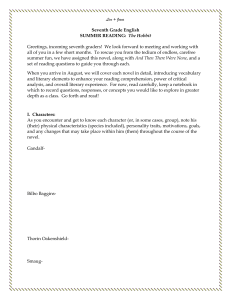10 th Grade Honors Summer Reading
advertisement
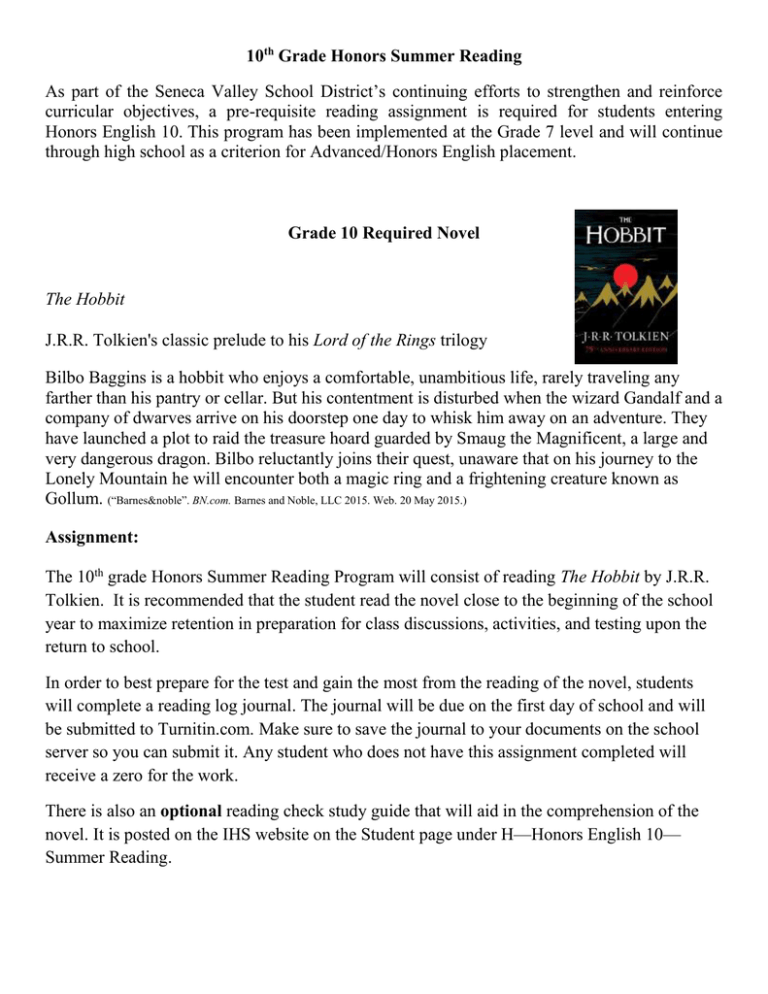
10th Grade Honors Summer Reading As part of the Seneca Valley School District’s continuing efforts to strengthen and reinforce curricular objectives, a pre-requisite reading assignment is required for students entering Honors English 10. This program has been implemented at the Grade 7 level and will continue through high school as a criterion for Advanced/Honors English placement. Grade 10 Required Novel The Hobbit J.R.R. Tolkien's classic prelude to his Lord of the Rings trilogy Bilbo Baggins is a hobbit who enjoys a comfortable, unambitious life, rarely traveling any farther than his pantry or cellar. But his contentment is disturbed when the wizard Gandalf and a company of dwarves arrive on his doorstep one day to whisk him away on an adventure. They have launched a plot to raid the treasure hoard guarded by Smaug the Magnificent, a large and very dangerous dragon. Bilbo reluctantly joins their quest, unaware that on his journey to the Lonely Mountain he will encounter both a magic ring and a frightening creature known as Gollum. (“Barnes&noble”. BN.com. Barnes and Noble, LLC 2015. Web. 20 May 2015.) Assignment: The 10th grade Honors Summer Reading Program will consist of reading The Hobbit by J.R.R. Tolkien. It is recommended that the student read the novel close to the beginning of the school year to maximize retention in preparation for class discussions, activities, and testing upon the return to school. In order to best prepare for the test and gain the most from the reading of the novel, students will complete a reading log journal. The journal will be due on the first day of school and will be submitted to Turnitin.com. Make sure to save the journal to your documents on the school server so you can submit it. Any student who does not have this assignment completed will receive a zero for the work. There is also an optional reading check study guide that will aid in the comprehension of the novel. It is posted on the IHS website on the Student page under H—Honors English 10— Summer Reading. The Hobbit Reading Log Journal A reading log journal requires you to choose quotes from the novel you are reading, and then reflect upon the quotes. As you are reading, you may want to use Post-it notes to mark where you may have questions or comments on events, people, quotations, or anything that you find interesting or unusual. You can then respond to these in your journal. Create a typed reading log of 19 entries (one from each chapter) that focuses on the Essential Questions, theme, events, and characters of the novel. Number your responses and include the page # of the quote for reference. The responses are to be your own original work and will be submitted to Turnitin.com on the first day of school. On the left side, copy a meaningful passage from that chapter - perhaps a bit of dialogue, a description, or a character’s thought. Be sure to label your entries and include the page number from which you copied it. These quotes should be a substantial length of three to four sentences. On the right side, write your response to the quotation. It should answer one or more of the following questions. o Make a connection with your own experience. What does the reading make you think of? Does it remind you of anything or anyone? o Make connections with other texts, concepts, or ideas you are familiar with. Do you see any similarities between these and other information? Can you make a literary connection? o Ask yourself questions about what you are reading. “I wonder why…” or “I don’t understand…” or “I was surprised by…” o Try agreeing with the writer and write down supporting ideas. Try arguing – on what points do you disagree? o Write down literary devices, images, phrases. Why did the author choose these? What do they add to the story? What made you notice them? o Each response should consist of 2-4 sentences. Do not just “translate” each quote. In other words, if the quote says, “The sky was cerulean,” don’t just say, “This means the sky was blue.” Reading Log Journal Example This is an example of a reading log journal for the novel Pride and Prejudice. To create the journal, open a Word Document, select Insert, select table, and create a page with two columns and 20 rows. Label the first column, first row—Chapter Quote; label the second column, first row—Reflection. Chapter Quote Reflection 1. (pg. 1) “It is a truth universally acknowledged that a single man in possession of a good fortune must be in want of a wife.” This is the first sentence of the book. When I first read it I thought the writer was serious—it seemed like something people might have believed when it was written. Soon I realized she was making fun of that attitude. I saw the movie Pride and Prejudice, but it didn’t have a lot of funny parts, so I didn’t expect the book to be funny at all. 2. (pg. 34) “She is tolerable, I suppose, but not handsome First of all, I didn’t think that a woman could be “handsome.” I also thought it was strange that he is rejecting Elizabeth right off the bat. I really don’t like Mr. Darcy at all because he thinks he is too good for her and is an arrogant snob. enough to tempt me; I am in no humour at present to give consequence to young ladies who are slighted by other men. You had better return to your partner and enjoy her smiles, for you are wasting your time with me.” 3. (pg. 57) “Vanity and pride are different things, though the words are often used synonymously. A person may be proud without being vain. Pride relates more to our opinion of ourselves, vanity to what we would have others think of us.” There are many uses of the word “pride” in the novel so far. This is interesting because it is the title of the novel. I feel as if I am not often proud of myself and I really need to work on that. Sometimes I focus too much on what other people think of me. Essential Questions for The Hobbit Consider the following Essential Questions as you are reading The Hobbit and responding in your reading log. 1. How can a person’s decisions and actions change his/her life? 2. How does Bilbo’s moral code emerge over the course of The Hobbit? What key evidence in the novel gives us insight into Bilbo’s particular definition of right and wrong? 3. Consider some of the moral problems that Tolkien identifies with the dwarves, their quest, and their treatment of Bilbo. What assessments can we make regarding the dwarves overcoming these moral challenges? 4. How did greed affect the characters? What part does wealth and materialism play in the novel? 5. What can the reader infer about Gandalf’s sense of good and evil? 6. How does luck and magic, and also fate and prophecy play a role in the novel? 7. Are there universal themes in literature that are of interest or concern to all cultures and societies? 8. Do the attributes of a hero remain the same over time? 9. In the face of adversity, what causes some individuals to prevail while others fail? 10. How do archetypes inform our understanding of literature and the world? 11. How are the hero, his/her quest, and his/her ideals still valid and useful in today’s world?

